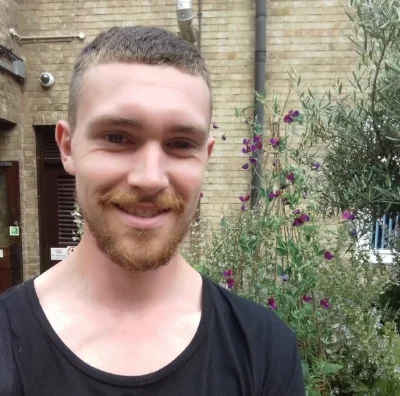An interview with Nicky, a Permaculture Design Course participant
"The frameworks for thinking that are part of permaculture helped me gain clarity and feel empowered to begin implementing change in my life."
My second interview was with Permaculture Design Course (PDC) participant Nicky, 26, who works with children with special needs. He is currently developing his practice as a yoga teacher and artist and he chose to do the permaculture design course hoping to learn more about the natural world, how to interact with and benefit from it. He is interested in developing off grid, self-reliant communities.
Me: Why did you decide to take the Permaculture Design Course?
Nicky: My partner introduced me to permaculture at a time when I really needed guidance- in the way I framed my thoughts and experiences and in how I (consciously or unconsciously) designed my life choices. I learnt how to look for the abundant within life, to turn to nature for inspiration. I learnt to recognise the effect erosive thought patterns and relationships have on self-esteem and productivity. The frameworks for thinking that are part of permaculture helped me gain clarity and feel empowered to begin implementing change in my life. I chose to do the permaculture course to learn more about resilient ways of thinking- to learn more about nature and how we can interact with our surroundings responsibly and with intelligence.
Me: Did you have any prior experience in permaculture or something similar?
Nicky: I had taken an Introduction to Permaculture Design course and I had also read Looby Macnamara’s book ‘People and Permaculture’ using the design web to help me quit smoking.
Me: What were your expectations of the course?
Nicky: I expected to learn about soil, water and energy and I expected to learn about how to build with natural materials. I was anticipating a deeper explanation of permaculture principles and different ways of approaching design. Lastly, I hoped to meet some inspiring people!
Me: Did anything on the course surprise you?
Nicky: The setting of the course, which was held in Mich Thill’s beautiful home and garden in Streatham. All of my experiences of education prior to this had been tied to sterile rooms with poor lighting, so it was a very welcome surprise to find that the environment for learning was so human!
Me: What did you like most about the course??
Nicky: Opportunity is given throughout the course to explore and express thoughts in depth. From the outset there is discussion about culture and what we, as students, want the culture of our course to be like. Each session drew upon and is responsive to the energy and interests of the group. Also learning through play was a major part of the course- what better way to learn about building with clay than to get covered in it! This was my first experience of a holistic type of learning and I loved it.
Me: What would you say is the most valuable lesson you have learned?
Nicky: To trust in the process and to be confident. The outcome of the course was to produce a design following the permaculture principles. There were constant moments of uncertainty and frustration whilst getting to grips with putting all that we had learnt into practice. This personal involvement and investment in making sense of the process is what makes the experience of learning so meaningful and empowering,
Me: Now you have finished, what are your next steps? How do you plan on using the course in your life?
Nicky: I have already started to use permaculture to help structure designs for projects. I am currently designing a workshop for a group of child refugees living in Calais. I am also about to go travelling to India, where I plan on volunteering on permaculture projects to strengthen my practice of permaculture design and to learn more about working with nature. On a personal level I have also been using Looby Macnamara’s Design Web to confront challenges myself and friends come up against. I have used it to help quit smoking and support friends through mental health concerns.
This blog post was written by Sophie Roach, who is currently interning with Social Landscapes. After working on a permaculture farm in Chile earlier this year, she is keen to learn more about the ethics and attitudinal principles of permaculture, and how these can be used to enrich the lives of children and young people. For more information on this project, please contact info@sociallandscapes.co.uk.

















Organising a Permaculture Design Course (PDC) is generally a great opportunity for a project or a community to integrate more of the Permaculture principles into their workings. Developing a well functioning Permaculture system however takes time… This is why I am excited to go back to Tribewanted Monestevole this coming October to deliver a second fully accredited PDC. It will be an opportunity to build on the lessons learned from last year’s course while continuing to build the Permaculture community across Europe.